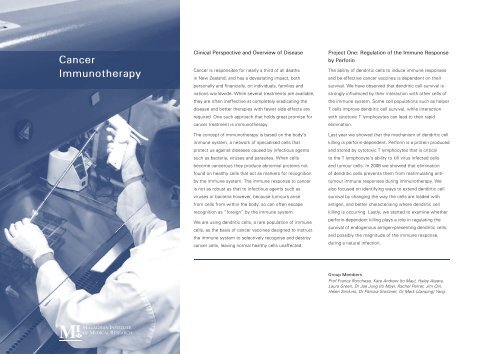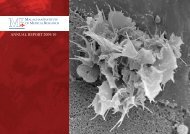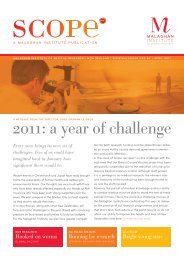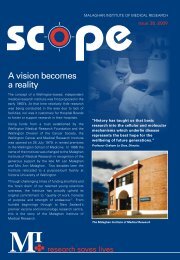Seminars - Malaghan Institute of Medical Research
Seminars - Malaghan Institute of Medical Research
Seminars - Malaghan Institute of Medical Research
You also want an ePaper? Increase the reach of your titles
YUMPU automatically turns print PDFs into web optimized ePapers that Google loves.
Cancer<br />
Immunotherapy<br />
Clinical Perspective and Overview <strong>of</strong> Disease Project One: Regulation <strong>of</strong> the Immune Response<br />
Cancer is responsible for nearly a third <strong>of</strong> all deaths<br />
in New Zealand, and has a devastating impact, both<br />
personally and financially, on individuals, families and<br />
nations worldwide. While several treatments are available,<br />
they are <strong>of</strong>ten ineffective at completely eradicating the<br />
disease and better therapies with fewer side effects are<br />
required. One such approach that holds great promise for<br />
cancer treatment is immunotherapy.<br />
The concept <strong>of</strong> immunotherapy is based on the body’s<br />
immune system, a network <strong>of</strong> specialised cells that<br />
protect us against diseases caused by infectious agents<br />
such as bacteria, viruses and parasites. When cells<br />
become cancerous they produce abnormal proteins not<br />
found on healthy cells that act as markers for recognition<br />
by the immune system. The immune response to cancer<br />
is not as robust as that to infectious agents such as<br />
viruses or bacteria however, because tumours arise<br />
from cells from within the body, so can <strong>of</strong>ten escape<br />
recognition as “foreign” by the immune system.<br />
We are using dendritic cells, a rare population <strong>of</strong> immune<br />
cells, as the basis <strong>of</strong> cancer vaccines designed to instruct<br />
the immune system to selectively recognise and destroy<br />
cancer cells, leaving normal healthy cells unaffected.<br />
by Perforin<br />
The ability <strong>of</strong> dendritic cells to induce immune responses<br />
and be effective cancer vaccines is dependent on their<br />
survival. We have observed that dendritic cell survival is<br />
strongly influenced by their interaction with other cells <strong>of</strong><br />
the immune system. Some cell populations such as helper<br />
T cells improve dendritic cell survival, while interaction<br />
with cytotoxic T lymphocytes can lead to their rapid<br />
elimination.<br />
Last year we showed that the mechanism <strong>of</strong> dendritic cell<br />
killing is perforin-dependent. Perforin is a protein produced<br />
and stored by cytotoxic T lymphocytes that is critical<br />
to the T lymphocyte’s ability to kill virus infected cells<br />
and tumour cells. In 2006 we showed that elimination<br />
<strong>of</strong> dendritic cells prevents them from restimulating anti-<br />
tumour immune responses during immunotherapy. We<br />
also focused on identifying ways to extend dendritic cell<br />
survival by changing the way the cells are loaded with<br />
antigen, and better characterising where dendritic cell<br />
killing is occurring. Lastly, we started to examine whether<br />
perforin-dependent killing plays a role in regulating the<br />
survival <strong>of</strong> endogenous antigen-presenting dendritic cells,<br />
and possibly the magnitude <strong>of</strong> the immune response,<br />
during a natural infection.<br />
Group Members<br />
Pr<strong>of</strong> Franca Ronchese, Kate Andrew (to May), Haley Ataera,<br />
Laura Green, Dr Jae Jung (to May), Rachel Perret, Jim Qin,<br />
Helen Simkins, Dr Patrizia Stoitzner, Dr Mark (Jianping) Yang







